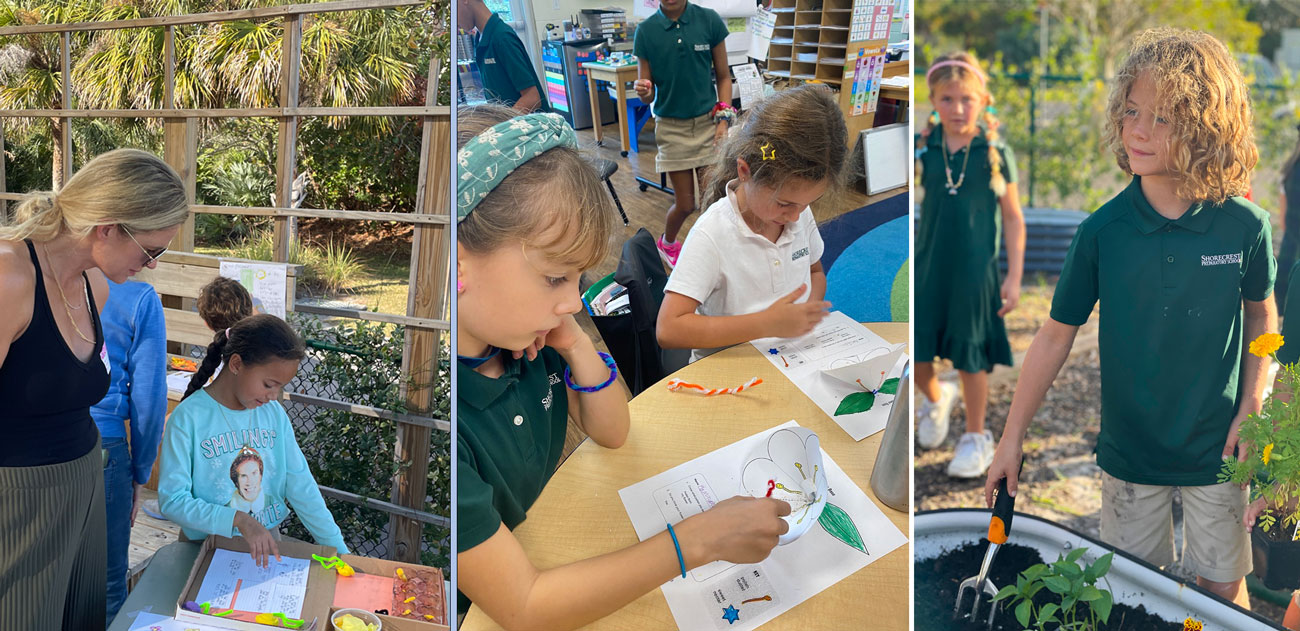

Second Grade Studies Plants and Pollinators
The second grade Plants and Pollinators inquiry is a months-long journey that blends classroom lessons with hands-on activities, and helps students explore and appreciate the natural world.
To kick off the unit, Shorecrest second graders planted pollinator-attracting plants in the Lower School Outdoor Classroom garden, guided by farmer Ray Wunderlich III, a former Shorecrest student and seasoned expert in sustainable gardening practices. This not only connected the students with nature but also instilled a sense of responsibility towards environmental stewardship.
Second graders had field experiences near and far. They visited the beehive on campus and watched foraging bees coming and going. Our school’s beekeeper, Josh Harris from Queen and Colony, removed some beehive frames. After years of hard work by our bees, the frames were full of honey! Second graders had the opportunity to use an extractor to release the liquid gold. The honey was jarred and given back to the school. Learning about honeybees, their habitats, roles within a colony, and the intricate anatomy that enables them to play a crucial role in pollination was a main focus of this plants and pollinators study.
An excursion to Fat Beet Farm in Tampa helped students understand how this sustainable urban farm uses interdependence as their model in growing microgreens, hydroponic produce and herbs. They also learned about the farm’s composting methods and use of solar energy to create a completely independent farm and restaurant. An adventure a little closer to campus at Sunken Gardens immersed students in varied and lush tropical foliage, giving them time to study in this historical St. Petersburg landmark.
Strolling over to Upper School to visit Science Teacher Mrs. Peck gave students another opportunity to learn more about the process of pollination. Mrs. Peck described in detail the importance of photosynthesis and its role in helping plants grow.
To showcase their learning, students in Mrs. Oman’s class performed an original play in the Lower School Outdoor Classroom. Mrs. Martin’s class recorded a newscast as their culminating event. Mrs. Johnson’s and Mrs. Granger’s students presented projects for their families.
The students recognize that if our world did not have pollinators like bees and the flowers that they pollinate there would be a lot of differences, such as:
- Hannah- The fruit we eat would not be available.
- Everett- We would not be able to eat honey.
- Ethan- Things may get so serious that people would have to pollinate by hand. That would take a ridiculous amount of time.
- Ajay- There would be no more bee products like soap, candles and cream.
- Avi- People would have less money because we wouldn’t have what we need to eat, so we would have to spend most of our time growing it.
- Gavin- There would be less cotton and people would have less clothes.
- Leah- If there’s less cotton we would have to sleep on scratchy sheets and use itchy towels.
- Liam- Animals who depend on flowers, trees and plants would go extinct. We depend on animals to live.
- Marlowe- We would not have beautiful flowers that make the world so pretty.
- Madisyn- There would be less oxygen if there were less trees and flowers.

























